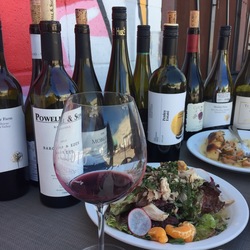Bodegas Martúe La Guardia
Martúe
Evolution Tempranillo 2019
Rich red and black cherry aromas, rich on the palate for an unoaked tempranilllo with fruit, chocolate, spice... balanced acid and tannins... a very yummy glass and wonderful with a lentil stew!! — 2 years ago
La Guardiense
Guardia Sanframondi Falanghina del Sannio
Xmass 2021 very good similar to Taburno Falanghina del Sannio S&M brought this would buy again — 4 years ago
Martúe
Pago Campo de la Guardia Cabernet Sauvignon Blend 2017
Profundo, maduro, intenso — 4 years ago
Rocca di Frassinello
Poggio alla Guardia Vigne Alte Maremma Toscana SuperTuscan Blend
Via Emilia
重くて渋みしっかり — 6 months ago
Giacomo Montresor
Gran Guardia Soave Garganega
Floral, melon, hay, apple, star fruit, nice acid. — a year ago
Ca' Lojera
Monte della Guardia Merlot
Ca’ Lojera, pronounced “callow yerra”, means “house of the wolf”, making this a Stark wine for GoT fans. The estate was originally the bishop’s Summer home, so here, the “wolves” refer to smugglers who used the estate as a base during the rest of the year.
Ca’ Lojera is primarily a producer of Lugana whites, but they grow a bit of Cabernet and Merlot for their rosato, and make stainless steel varietal wines of each. The Merlot is surprisingly good, with smooth, clean cherry and blueberry fruits, and just a touch of pepper spice bite to the finish. — 2 years ago
Altos De La Guardia
Rioja Tempranillo 2022
Wonderful bottle. Nicely bold and dry with dark fruit and oak notes. I would take this bottle confidently to any get together. — 7 months ago
Ca' Lojera
Monte della Guardia Rosato 2002
This delicious rosé is medium dry, very light, with faint strawberry and honeysuckle flavors. — 2 years ago
Fattoria di Pignano
Rosso del Guardia Ciliegiolo - Abrusco 2017
Bold, full flavor. Tuscany — 4 years ago



Matthew Doty
2019 vintage. Dry, but quite nice. Allow to breathe for 24 hours. — 3 months ago